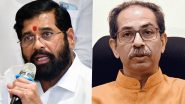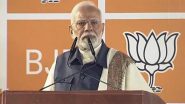New Delhi, Nov 23 (PTI) Popular radio personality and writer Yunus Khan on Saturday said his book "Ummidon Ke Geetkar Shailendra" was born out of his desire to honour the legacy of one of India's most celebrated lyricists.
The book, published by Rajkamal Prakashan, is an ode to Shailendra, who wrote the lyrics of many classic songs that remain iconic to this day, including "Awara Hoon" from Raj Kapoor's "Awara"; "Mera Joota Hai Japani" and "Pyaar Hua Ikraar Hua" from "Shree 420"; and "Gaata Rahe Mera Dil" from "Guide".
"The year 2023 marked the 100th birth anniversary of Shailendra. At the beginning of 2022, I thought about paying tribute to my favorite musician. Then the question arose, what would be the format of this project?
"After much thought, I decided to pick some films and explore how Shailendra's songs reflected his times and the struggles of the 'little man' who had nobody on his side," Khan said.
He was speaking at the session "Bollywood Biographies" during the Sahitya Aaj Tak at the Major Dhyan Chand National Stadium here.
Khan said Shailendra's lyrics always carried hope, even in the face of adversity, and that was the reason why he titled the book "Ummidon Ke Geetkar Shailendra".
"He is one songwriter who never let go of hope in any circumstance," he added. There are 21 chapters in the book, including one that details the role Shailendra played in Bhojpuri cinema.
"He wrote the songs for 'Ganga Maiyya Tohe Piyari Chadhaibo', the first Bhojpuri movie, released in 1963," Khan said.
At the session, Khan was joined by Sahar Zaman, granddaughter of Talat Mahmood and author of "Talat Mahmood: The Definitive Biography".
Zaman said the All India Radio played a huge role in the career of Mehmood, the legendary playback singer and ghazal maestro known for songs such as "Hamse Aaya Na Gaya" (From "Dekh Kabira Roya"), "Sab Kuchh Loota Ke" (From "Ek Saal"), "Har Sham Sham-E-Gham" (From "Mera Salaam") and "Raat Ne Kya Kya Khwab Dikhaye" (From "Ek Gaon Ki Kahani").
"There is a whole section in the book that delves into the significance of radio. In the 1930s, Lucknow AIR was launched after Delhi, Lahore, Karachi, and Kolkata. He was 16 at the time and had always aspired to become a singer. He graduated in music, but his career began with Lucknow AIR, and that became his voice," she said.
Zaman said as she travels to different corners of the country to promote the book and have discussions with people, she has realised why Mahmood's popularity has stood the test of time.
"People want to know about him, and that's why they attend my events... There are a lot of family stories about him that I've included in the book," she said about the self-published book that came out in December last year.
She said she also got to talk to many of Mahmood's colleagues, most of whom are now in their 90s.
"What's so interesting is that he was the first Indian musician to introduce the concept of world concerts. He went on his first world tour in 1956, and I got to speak to his concert manager—the person responsible for the orchestra," she added.
(This is an unedited and auto-generated story from Syndicated News feed, LatestLY Staff may not have modified or edited the content body)













 Quickly
Quickly
















